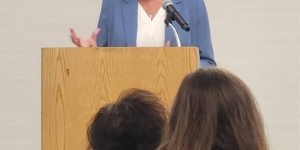Speech
Head of the Office on Violence Against Women Bea Hanson Delivers Remarks at the End Violence Against Women International Conference
Location
United States
Thank you, Vanita [Gupta] for those kind words and for your remarkable leadership at the Civil Rights Division. I also want to thank Ron Davis of the COPS Office. A high point of my tenure at the Office on Violence Against Women (OVW) has been forging true partnerships with the two of you and your extraordinary staff. I also want to thank Joanne Archambault and her team at End Violence Against Women (EVAW) for putting together this important conference, and all of you for your commitment to make the world a safer place for victims of domestic violence and sexual abuse.
Since the passage of the Violence Against Women Act (VAWA) in 1994, the Justice Department has worked to improve the criminal justice response to violence against women, particularly through grant funding administered by OVW. We have distributed more than $6 billion to transform the way communities respond to sexual assault and domestic violence, yielding dramatic results in many jurisdictions. VAWA grants have supported collaboration between law enforcement and victim service providers; created specialized law enforcement and prosecution units; improved training for police, prosecutors and judges; enhanced services in marginalized communities; and pioneered innovations such as enhanced offender monitoring, domestic violence courts and the use of evidence-based lethality assessments to curb domestic violence homicides.
The Justice Department and our partners in law enforcement, prosecution, victim services and elsewhere should be rightfully proud of our accomplishments. But, we also know that our progress has been uneven, and many communities still struggle to implement effective responses.
As you heard from Vanita, the Civil Rights Division has engaged in ground-breaking use of its enforcement authority to hold jurisdictions accountable for failing to meet their obligations to respond to violence against women. And, while the Civil Rights Division’s investigations have exposed ways that gender and race bias can undermine police response, these investigations have also paved the way to progress and reform. They have highlighted how collaborations between law enforcement and victim service providers can create meaningful change in both law enforcement agencies and communities as a whole.
The Civil Rights Division, OVW and the COPS Office are involved in many partnerships with state, local and tribal law enforcement agencies. And through these partnerships we have recognized that many agencies are seeking assistance and support for their efforts to improve their response to sexual assault and domestic violence. The guidance is intended to reflect and further our partnerships with police leaders, line officers and detectives who are dedicated to policing that is free from bias and to keeping their communities safe. It also reflects our ongoing and important partnerships with advocates and service providers who make sure that we hear – and listen to - the voices of survivors.
At OVW, our job is to ensure that VAWA funding provides communities nationwide with resources and technical assistance as they work to improve their responses to sexual assault and domestic violence.
And this role has given me the opportunity to work with incredibly committed and talented people from all across the country.
Last August, 40 law enforcement executives and officers, prosecutors, domestic violence and sexual assault victim advocates and academics came together here in Washington, D.C. for a one day symposium to discuss gender bias in policing. They came with a shared vision and a shared commitment to make sure that when a victim goes to the police – in no matter what city, in no matter what neighborhood – she will be treated with respect. And that the very first response of law enforcement will be to believe her story.
Today, we the COPS Office and the Police Executive Research Forum are releasing a report of that convening. I want to thank each and every one of the participants, some of whom are here today, for their crucial role in helping to lay the foundations for the guidance and for sharing promising practices in creating justice for victims of domestic and sexual violence and their communities.
OVW’s role moving forward is to provide funding, training and technical assistance to jurisdictions to address many of the issues raised in the guidance. This includes support for specialized law enforcement units to properly question victims and investigate cases; and for domestic violence and sexual assault training such as that already provided by EVAW.
I encourage you to take a look at both the report and the guidance. You can find both on the COPS and OVW websites. In the report you will find promising practices and recommendations. In the guidance you will find information about trainings that are available through OVW funding, model policies and other useful resources.
I’m excited that at OVW we are already supporting this important initiative. Later this year we’ll be announcing the results of our first ever solicitation to include a specific purpose area to provide technical assistance to help jurisdictions implement the guidance.
I look forward to seeing some of you in our workshop at 12:30 p.m. EDT this afternoon where we will be talking about all of this in more depth.
I just want to end by thanking all of you for your commitment to this important work, moving us toward a safer, more just world for victims of domestic violence and sexual assault.
Component
Updated September 27, 2016

 U.S. Department
of Justice
U.S. Department
of Justice
